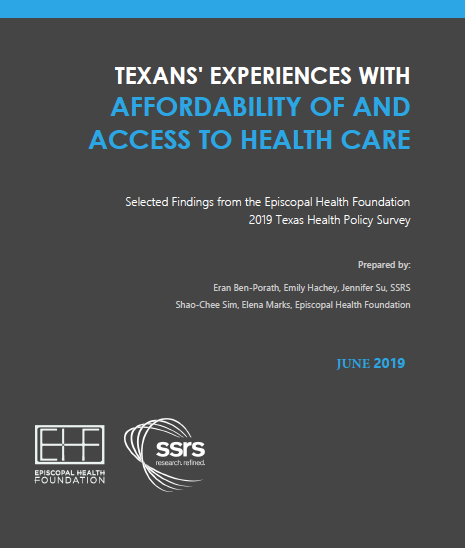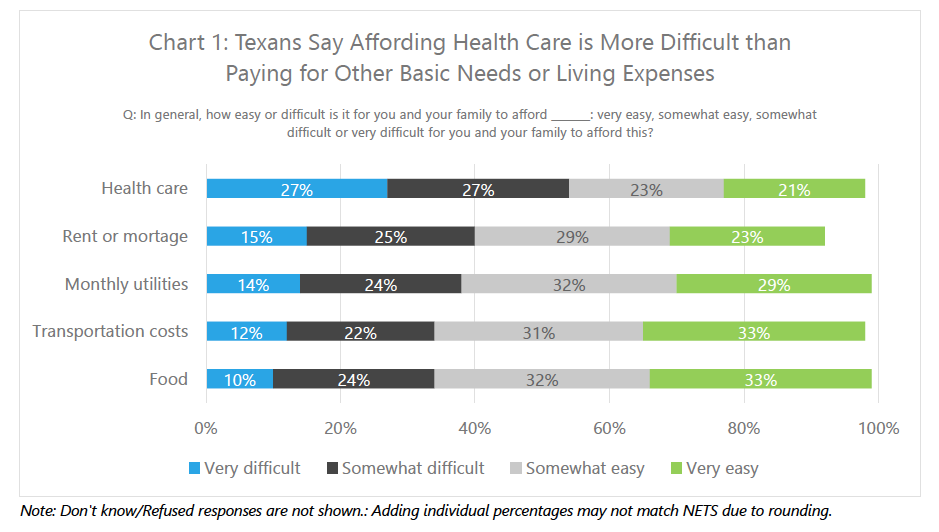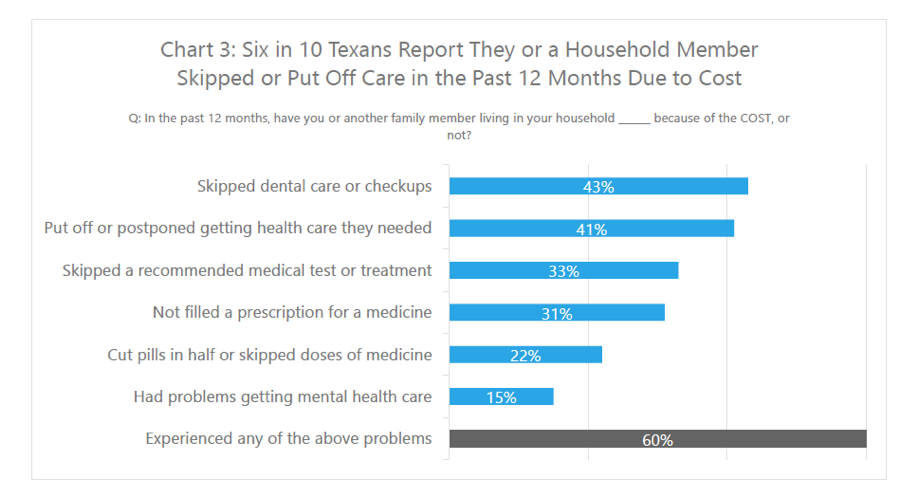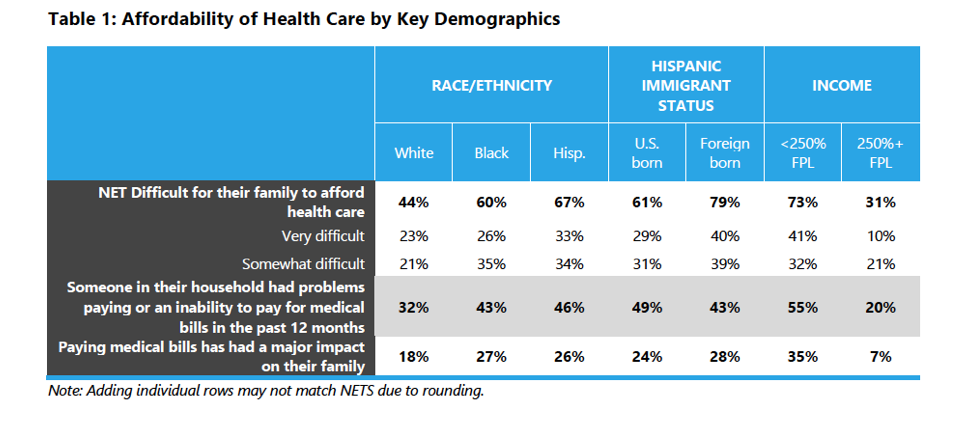 View the Complete Survey Report
View the Complete Survey Report
Researchers found that fewer Texans reported difficulties affording other basic necessities like rent or mortgage, monthly utilities, transportation costs, or food.
Faced with costs they can’t afford, the poll found that 60% of Texans say they or someone in their household skipped or postponed health care needs. Texans report that they skipped dental care or checkups (43%), postponed getting medical care they needed (41%), skipped a recommended test or treatment (33%), didn’t fill a prescription (31%), cut pills in half or skipped doses (22%), or had problems getting mental health care (15%).
In addition, the poll found that almost one quarter of Texans (24%) say they don’t have a usual place to go when they get sick or need care. Another 5% of Texans say they usually go to the emergency room for their medical care.
 “We hear the stories every day and these numbers confirm that trouble paying for health care isn’t only affecting Texans’ bank accounts, it’s having a direct impact on their health,” said Elena Marks, EHF’s President and CEO. “This is why Texans continue to tell us they want state lawmakers to do more to make the health system work better and provide more access to affordable care.”
“We hear the stories every day and these numbers confirm that trouble paying for health care isn’t only affecting Texans’ bank accounts, it’s having a direct impact on their health,” said Elena Marks, EHF’s President and CEO. “This is why Texans continue to tell us they want state lawmakers to do more to make the health system work better and provide more access to affordable care.”
Previous findings from EHF’s health policy poll that were released in March found that 91% of Texans say the state should play a role in making sure the health system works well and majorities say the state’s top health priorities should be lowering health care costs (59%) and increasing access to health insurance (57%).
Texas has the highest number of uninsured residents in the nation and the highest uninsured rate (19.6% uninsured under age 65) of any state, so it’s no surprise that uninsured are among the groups who say they’re most affected by health care affordability. The poll found that the vast majority of those without health insurance say they have difficulty affording health care (85%), including more than half (54%) who say it’s very difficult. Three-quarters of uninsured Texans (75%) say they skipped or postponed care, including 61% who say they skipped or postponed care they needed and 46% who say skipped a recommended test or treatment.
Cost is the main obstacle to getting more Texans insured. More than half (53%) of uninsured Texans say the primary reason they don’t have coverage is because it’s too expensive. Far fewer cite other reasons such as employment issues (15%), citizenship/residency issues (6%), or not wanting or needing it (2%).
“These findings are evidence that even with all the resources available to us health care is simply too expensive and too difficult to access for too many Texans,” Marks said. “This survey speaks for Texans, but access and affordability are issues affecting individuals and families across the U.S. EHF is working every day so that more people can access the care they need to live healthy, productive lives.”
The poll also found that 73% of people in households with incomes less than 250% of the federal poverty level ($62,750 for a family of four) and 67% of Hispanic residents say it’s difficult for them to afford health care.
In addition, nearly four in 10 Texans (39%) say they or someone in their household had problems paying medical bills in the past year. Most of this group (and 22% of all Texans) say medical bills had a major impact on their family.
Methodology
The findings come from the second report in a 2019 series based on EHF’s poll of Texans. The first report captured residents’ views of and experiences around state health policy and Medicaid.
SSRS, an independent research company from Glen Mills, PA, conducted the Texas Health Policy Survey on behalf of Episcopal Health Foundation (EHF) from January 3 through January 25, 2019. The goal of this survey was to detail the attitudes and experiences of Texas adults regarding their health care, with a comparison to a similar study completed in 2018. For the Texas Health Policy Survey, SSRS interviewed a representative sample of 1,210 Texas adults (age 18 or older), reached via landline (n=345) and cell phone (n=865) random digit dialing (RDD). Sample was provided by Marketing Systems Group (MSG). Interviews were conducted by professional telephone interviewers in English or Spanish based on the respondent’s language preference. Weighting is generally used in survey analysis to compensate for sample designs and patterns of non-response that might bias results. The survey data are weighted to balance the sample demographics to match estimates for the Texas adult population. The margin of sampling error for this study is +/- 3.6 percentage points for results based on the total sample.
For more information or to schedule an interview, contact Brian Sasser at bsasser@episcopalhealth.org or 832-795-9404.


